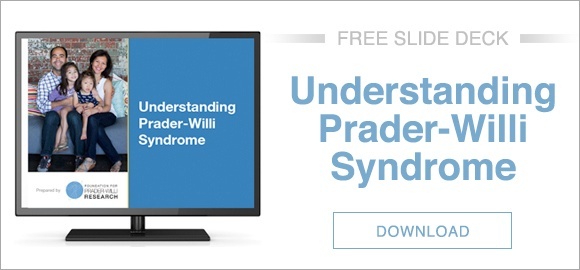On June 23, FPWR research staff members Theresa Strong and Jessica Bohonowych presented a webinar reviewing recent initiatives funded through FPWR. The webinar is available on video below. It includes an overview of newly funded studies, new opportunities and advances in PWS research.
Research funded in 2017 supports FPWR's five-year research plan, with the goal of eliminating the challenges of PWS through the advancement of research. Their presentation briefly reviews research to date since 2004, and then focuses on studies in progress that were initiated in 2017, including nine studies with grants totalling $800,000:
- Proof of Concept Study of Vagus Nerve Stimulation From An External Device In PWS (Year 2), Tony Holland, MRCP, University of Cambridge
- Transcranial Direct Current Stimulation, Startle Modulation and Event-related Potentials of the Brain (year 2), Merlin Butler, PhD, University of Kansas Medical Center
- Role of the Endocannabinoid System in PWS-Induced Osteoporosis and Skeletal Growth, Yossi Tam, DMD, PhD, Hebrew University of Jerusalem
- Prevalence and Aetiology of PWS Low Level Mosaicism In UPD Undetected By Standard Testing, David Godler, PhD, Murdoch Children’s Research Institute
- Developing Objective Biomarkers of Hyperphagia In Children With PWS, Alexandra Key, PhD, Vanderbilt University
- A Post-Mortem Study of von Economo Neurons In the Frontal Cortex of Brains of Persons With PWS (year 2), Patrick Hof, MD, Icahn School of Medicine at Mount Sinai
- Gene Expression Analysis in PWS Subject Derived Dental Pulp Stem Cell Neurons (year 2), Lawrence Reiter, PhD, University of Tennessee Health Sciences
- Therapeutic Potential of Blocking Zinc Finger Protein 374 Binding to the PWS Locus, Marc LaLande, PhD, University of Connecticut
- Evaluating Factors That May Affect the Efficacy of Intranasal Oxytocin Treatment in PWS. Daniel Driscoll, MD, PhD, University of Florida
To hear FPWR's research team describe these studies, watch the video below. This blog also provides a brief overview of PWS studies funded by FPWR in 2017.








